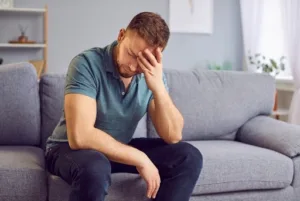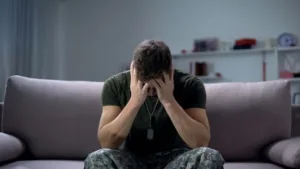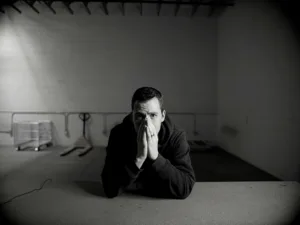According to the Anxiety and Depression Association of America, anxiety disorders are the most common mental illness in America, affecting more than 40 million adults. Though men and women experience anxiety, the signs of anxiety in men can be different than their female counterparts. Signs may creep in as stress, anger, or even physical pain. Pressure from society and work, past trauma, and relationship issues often trigger male anxiety. Don’t panic, there’s assistance available. Therapy and some lifestyle tweaks go a long way.
Anxiety is normal
Everyone gets anxious. We all get anxiety. Not all anxiety is “bad” or means we have an anxiety disorder. Anxiety can be very helpful in preparing us for an important project or life event. We all know that feeling we get in our stomach when we have an upcoming test or work presentation. That anxiety feeling is our body’s way of telling us we need to prepare or be ready. That is healthy anxiety. However, anxiety can become unhealthy if we ignore it or allow it to build over time. As we avoid dealing with what’s making us anxious, it can become so overwhelming we shut down. Or in the case of many men, that anxiety turns to anger. Because we live in an increasingly stressful and demanding world, it’s important that we be aware of our own anxiety levels.
Signs of anxiety in men
Men are generally less likely to be diagnosed with anxiety, and less likely to get treatment for it. A big reason for this is that men seek treatment less frequently and minimize their symptoms. While women are more comfortable seeking out professional help, some men might not consider therapy as an option.
Some men learned as kids or teenagers to ignore or distract themselves from anxiety. Signs of anxiety in men:
- Anger and irritability
- Headaches
- Muscle aches and pains
- Sleeping problems
- Strained relationships
Unhealthy ways some men cope with their anxiety by:
- Alcohol and Drug Abuse
- “Bottle it up” and ignore it.
- Attempt to control others and their environment.
Men with anxiety disorders can often be aggressive rather than worrisome or nervous. They avoid emotional expression and refuse to be vulnerable, which then comes out in explosions of anger or rage. When it comes to depression, men often isolate themselves from loved ones. They also refuse to talk about their feelings and feel pressure to appear stoic.
Differences Between Male and Female Anxiety
Men and women historically express anxiety differently, influenced by cultural norms and gendered expectations. Many men have it drilled into them that they should be “strong” and “stoic,” leading to emotional restrictiveness and making them less likely to seek mental health support when experiencing anxiety. The stigma surrounding male anxiety can prevent open discussions about feelings, contributing to increased suicide risk. Many men have had negative experiences when they have tried to open up about their anxiety. While women may directly confront their anxiety or seek a supportive network, men often exhibit physical anxiety symptoms, such as sweating or a racing heart. This can escalate to severe mental health outcomes, including self-harm and issues with dating, highlighting the need for effective suicide prevention strategies.
Anxiety Disorders
Men can experience a number of anxiety disorders, with Generalized Anxiety Disorder (GAD) and Social Anxiety Disorder (SAD) being particularly prevalent. Performance anxiety, especially in work or social settings, poses another challenge. Often, men might also experience anxiety alongside other mental health conditions, like depression, which can complicate diagnosis and treatment. Understanding these mental health issues and their specific impact on men is crucial, especially since many men combat anxiety through problem-solving rather than seeking medical help, delaying effective treatment. Traditional masculine norms discourage emotional expression, highlighting the need for suicide prevention strategies and mental health support to promote healthy masculinity and emotional wellbeing.
Some of the most common anxiety disorders are:
- GAD or Generalized Anxiety Disorder – GAD is characterized by persistent and excessive worry about a number of different things, with difficulty controlling it and often expecting the worst.
- Panic Disorder – People who experience repeated spontaneous, out-of-the-blue panic attacks and are constantly worried about another attack.
- Social Anxiety Disorder – Also called social phobia, Social Anxiety Disorder is intense anxiety or fear of being judged or rejected in a social setting.
- Specific Phobias – People with phobias like a fear of heights, bugs, and new places suffer from strong, irrational fears of these and many other common (and some not-so-common) things. They will often feel powerless and actively avoid them.
- Posttraumatic Stress Disorder – More commonly known as PTSD, this disorder is a serious, potentially debilitating condition that can occur in people who have been exposed to traumatic events.
Signs and Symptoms of Male Anxiety
Physical Symptoms in Men
Anxiety in men can manifest in a variety of physical ways. You might have chronic headaches that simply wouldn’t quit. Your muscles may feel like they’re permanently tight and tense. They’re common signs anxiety may be in play for you. Anxiety can get your heart racing. You may feel like you just ran a mile while remaining perfectly still. This elevated heart rate along with other cardiovascular symptoms can be a huge flag. It’s important to understand that these physical symptoms aren’t all in your head—they’re real, and they deserve attention. While it may be easier to ignore them, it’s by addressing them that you will feel better.
There’s also a link between anxiety and long-term health issues. Men may use substances, such as alcohol or drugs, as an unhealthy way to cope. This may seem like it solves the problem in the short term, but it just creates more problems later. Remembering these physical symptoms is a first step toward treating anxiety. It’s about knowing what’s up with your body and doing what’s necessary to address it. Think of it as a way to take back control of your life and health.
Emotional and Behavioral Indicators
Emotionally, anxiety could leave you feeling stuck in a cycle of fear and worry. You may feel sad or hopeless, even when things are okay. These feelings can be consuming — but they’re also fairly normal symptoms of anxiety. You have to recognize them if you’re going to understand how you’re doing mentally. Behaviorally, anxiety could cause you to withdraw from relationships or activities you used to love. According to Stephen Rodgers, LCSW “in terms of social anxiety, we see a lot of men avoid social situations because it’s causing some anxiety. What they don’t know is that the more they avoid what causing the anxiety, the worse it gets over time.” This avoidance of social situations can feel very lonely. You may feel that you’re disconnected from the people and things you value most. The first step in managing anxiety is recognizing these changes.
If you build emotional resilience, you’ll be better able to cope with anxiety. It’s about building the strength to confront your emotions directly and having healthy coping mechanisms. Seeking support is a necessary step, too. The difference can also be made by talking to a therapist, a friend, or a support group. When you share your stories, it really makes a difference. You are not alone on this journey, and asking for help is a brave act of self-care.
Impact on Daily Life
Anxiety can wreak havoc on your social life and relationships. You might think you are on your own. Social situations can make you feel like you have to be on high alert. This can swing friendships and family relationships out of whack, too — and make you feel more alone. At work, anxiety may impact your performance, making it difficult to concentrate or complete tasks. This can stifle your career growth and can ultimately leave you feeling unfulfilled. This is something that needs to be treated early on, because if not, you can develop a more serious mental health issue, like depression, she added.
Untreated anxiety can snowball, impacting every aspect of your life. That’s why it’s so important to deal with it sooner rather than later. For more tips and ideas on how to live better with your anxiety, go to … Taking steps to manage anxiety empowers you to take control of your mental health. It builds a more integrated, satisfying life.
Causes and Triggers of Male Anxiety
Biological Factors
When we talk about anxiety in men, it’s crucial to consider the biological and genetic influences that can impact mental health outcomes. Genetics plays a role, but it isn’t as straightforward as inheriting one “anxiety gene.” Instead, we find a multigenic genetic package that can increase the risk of anxiety disorders. This genetic predisposition doesn’t doom individuals to mental health disorders, but it does elevate their risk, much like playing poker with a stacked deck. While it doesn’t guarantee specific outcomes, it certainly influences the likelihood of developing anxiety issues.
Hormones, such as testosterone, also play a significant role in emotional wellbeing. An imbalance in testosterone levels can lead to mood and anxiety changes, with low testosterone potentially exacerbating anxiety symptoms. Understanding these biological factors is key to suicide prevention strategies, as they can help men identify their vulnerabilities. By knowing their hormonal balance, men can take proactive steps to manage their mental health, ultimately reducing the risk of suicide and improving overall wellbeing.
Moreover, biological predispositions can influence the severity of anxiety symptoms, leading to psychological comorbidities in some men. Recognizing one’s unique biological makeup is essential for tailoring effective treatment plans. This personalized approach to therapy not only enhances the effectiveness of mental health care but also empowers men to take control of their mental health and emotional states, fostering lasting recovery and resilience against future mental health challenges.
Social and Environmental Influences
Social and environmental factors significantly influence men’s anxiety levels, with social isolation often intensifying anxiety symptoms. Many men struggle with the overwhelming pressure of life stress, feeling as though all the world’s challenges rest solely on their shoulders. Without informal support from friends and family, managing anxiety becomes increasingly difficult. A strong support system is essential for emotional wellbeing, providing a network to lean on during tough times and reducing the risk of severe anxiety.
Stressful environments, particularly high-pressure jobs, can greatly impact mental health outcomes. Work-related stress is a major contributor to anxiety disorders, leading to chronic stress that exacerbates anxiety experiences. This vicious cycle can be challenging to escape, as untreated anxiety disorders often escalate without appropriate mental health care and support.
Supportive relationships play a crucial role in mitigating anxiety symptoms. Engaging in community and social activities can help reduce feelings of isolation and improve overall wellbeing. It’s vital to strike a balance, ensuring that you have a community to rely on during difficult periods, as this informal support can be instrumental in promoting lasting recovery and emotional balance.
Stress and Life Events
Life can throw some curveballs that trigger anxiety, leading to significant mental health outcomes. Big life changes, such as losing a job or experiencing a relationship breakdown, are particularly stressful. These events can rattle your foundation and raise anxiety levels. It’s not just the major events, though; ongoing stress, even from relatively small issues, can accumulate and take a toll on your mental health. This cumulative effect can contribute to severe anxiety and even increase the risk of suicide among men.
Managing stress effectively is crucial to keeping anxiety levels at bay. Techniques such as mindfulness, exercise, and proper rest can significantly reduce stress. Lifting weights has also been shown to improve anxiety symptoms. Understanding life stressors and being proactive about them matters greatly for emotional wellbeing. Taking charge of your mental health not only helps in preventing overwhelming anxiety but also promotes healthier coping mechanisms, which are essential for long-term recovery.
Effective Treatment Options
1. Therapy Approaches for Men
Therapy is as powerful a tool as you’ll find when it comes to dealing with anxiety, particularly for many men who face unique challenges related to mental health outcomes. EMDR (Eye Movement Desensitization and Reprocessing) therapy is a highly effective, evidence-based treatment for anxiety disorders. By targeting distressing memories and the negative beliefs tied to them, EMDR helps individuals process and reframe past experiences that contribute to ongoing anxiety. The therapy uses guided eye movements or other forms of bilateral stimulation, which, according to research, can reduce the intensity of these memories, allowing the brain to “digest” unresolved trauma or stress. This process enables clients to build a healthier perspective on their past, reducing the power of anxiety triggers in the present. With EMDR, clients often experience significant relief from anxiety symptoms and gain an increased sense of control and calm in their daily lives.
Group therapy also plays a crucial role by bringing men together to share experiences and support one another. There’s something incredibly validating about knowing you’re not alone in your struggles, especially when discussing male suicides and the stigma surrounding mental health issues. Group therapy creates a space for men to openly discuss their struggles and achievements, breeding camaraderie and a shared sense of power that can combat feelings of hopelessness.
In general, psychotherapy is a process of making sense of emotions and developing coping mechanisms. It’s about recognizing those deep-seated fears and anxieties, including male anxiety symptoms, and moving through them. Techniques such as EMDR are particularly effective for trauma, PTSD, and panic disorders, allowing your brain to heal by reprocessing upsetting memories. Exposure therapy is a proven method for treating social anxiety and phobias, enabling you to experience your fears in a safe, supportive environment.
Please don’t think of therapy as a crutch or a weakness. Embrace it as an active way to confront your anxiety and emotional wellbeing! You’re owning it, experimenting with what feels right for you, and fighting for your mental health, which is vital for lasting recovery.
2. Medication for Anxiety Relief
Sometimes therapy alone isn’t cutting it, and that’s when I end up on medication for my mental health condition. Common options like SSRIs (Selective Serotonin Reuptake Inhibitors) and benzodiazepines are frequently prescribed to assist in managing anxiety symptoms, which can encompass various mental health disorders. When used alongside effective treatments like therapy, these medications can significantly enhance overall wellbeing.
Check with a mental health professional to help you navigate through medication management. They can evaluate your symptoms and test for underlying problems, including testosterone levels. Then, they decide if TRT could be right for you. With medications, it usually takes a minimum of two weeks to start working. You will need some patience and tweaking to find the right medication and dose.
Stay vigilant for possible side effects and the need for ongoing evaluation to maintain the efficacy of your medication. Remember, medication is only one piece of the puzzle. By integrating it into a comprehensive treatment plan, you’ll be better equipped to manage your mental health outcomes effectively.
3. Lifestyle Changes for Better Management
Don’t underestimate the role of lifestyle changes in managing anxiety disorders, particularly when considering the mental health outcomes for many men. Engaging in regular physical activity naturally reduces anxiety symptoms and releases feel-good endorphins, which contribute to emotional wellbeing. Coupled with a healthy diet and good sleep routine, these practices lay the foundation for resilience and help combat the negative emotions often associated with untreated anxiety disorders.
Mindfulness practices, like meditation, provide another layer of support for emotional regulation systems. They train you to be present, relax, and handle anxiety better, which is crucial for reducing anxiety. By keeping your focus on the moment at hand, you cultivate calmness and sharpness in your daily living, which can significantly improve overall mental health.
Limiting alcohol and drug use is vital for improving mental health care and outcomes. These substances can exacerbate anxiety symptoms, leading to heightened psychological distress and increasing the risk of suicide attempts. Reducing or eliminating them can make a significant difference in emotional functioning and promote healthier lifestyle choices that support sustained recovery.
What can you do about your anxiety?
There are a number of things you can do to help with anxiety. Things like eating healthier and exercising on a regular basis. Learning to open up and talk about what’s bothering you can also help you feel more grounded and present. We suggest engaging in healthy activities that you love. Being outside, yoga, working out or hanging out with loved ones are all research-supported ways to reduce anxiety.
If you’re a man feeling like you might have an anxiety disorder or even just struggle with your anxiety, you should seek help in the form of therapy. Seeing a therapist is not a sign of weakness. Getting support is difficult to ask for, it takes strength to ask for help. In therapy, you’ll learn tools you can use to help identify the cause of your anxiety. You can also learn how to cope with anxiety, so you can live a happier and healthier life.
Other Coping Strategies and Support
Practical Coping Techniques for Men
What I’d like you to do is go ahead and give me some real, practical ways that we can address anxiety, particularly in the context of mental health outcomes for men. First up is journaling. It’s not just about writing down random thoughts; consider it a tool for reporters to gnaw on those anxious feelings that keep you awake at night. By writing them down, you can see them on paper, and sometimes they don’t feel quite as scary. This practice can also help identify patterns or triggers that may otherwise go unnoticed, contributing to a deeper understanding of male anxiety symptoms.
Then, there’s the magic of hobbies. Yep, hobbies — whether it’s painting, fishing, or fixing up that old bike in your garage. When you’re knee-deep in something you love, your mind gets a break from the constant whirlwind of anxiety, which is crucial for emotional wellbeing. It’s like pressing pause on stress and can serve as a form of informal support that many men need to combat the pressures of life.
Another gem is progressive muscle relaxation, an effective treatment methodology that is just easy. You tense a muscle group, hold it, and then release. Go from your toes up to your head. This technique provides a nice physical release of that tension, helping to alleviate physical anxiety symptoms.
Lastly, let’s talk about goal setting – can’t forget that one. Come on, don’t shoot for the moon initially. Begin small, perhaps by making your bed every morning or preparing one meal. These small wins can ultimately snowball into bigger victories, promoting lasting recovery and doing wonders in keeping worries at bay, especially for those grappling with anxiety disorders.
Building a Support Network
So now, back to your support crew. Having a network of supportive relationships can be a lifeline for mental health outcomes, especially when it comes to managing anxiety and depression. Sometimes, just knowing you’ve got people in your corner can make all the difference. How do you find them? Join a club or a community group. Whether it’s a sports team or a book club, shared interests can foster solid connections that help combat feelings of isolation.
Don’t forget about informal supports—your friends and family. They’re usually the first to detect something wrong, which is crucial since many men struggle with mental health disorders. Let them in. Just talk about what’s happening.
Open communication about mental health is key to strengthening these networks and can be a vital component of effective suicide prevention strategies. The more we talk, the more we normalize these conversations. Don’t be afraid to tell your best friend over coffee or to call up a family member. You might be surprised at how much it helps in promoting emotional wellbeing and fostering recovery.
Encouraging Open Conversations
Speaking of talking, let’s dive into the open conversation about mental health, particularly focusing on male anxiety symptoms. It’s really important because every time we talk, we chip away at the stigma surrounding mental health issues. It’s about being brave enough to say, “Hey, I’m struggling,” and not feel less of a man for it, especially when addressing the complexities of masculinity in relation to emotional wellbeing.
Sharing your experiences can lead to understanding and emotional support. You never know, because your story might just be what someone else needs to hear. It’s about creating those safe spaces where men can be honest about what they’re going through, which can significantly contribute to suicide prevention strategies and reduce suicide risk among males.
Education plays a big role here, too. The more we understand about male mental health outcomes, particularly the impact of untreated anxiety disorders, the more prepared we are to deal with them. Let’s inspire learning environments that provide us with coping skills and mental health support. Together, we can build spaces where we learn to fuel one another and flourish in the face of anxiety.
Conclusion
Sometimes anxiety isn’t a passing thing; it’s real with a ton of men out there.
You are not on this journey alone.
I think a lot of guys struggle with this.
By coming forward and asking for help, you’re displaying guts of the highest order.
It’s like taking this heavy weight off your shoulders, allowing you the freedom to live better.
Therapy helps you confront anxiety, restoring a sense of control and equilibrium.
At Denver Men’s Therapy, it’s about you.
We have a real understanding of just the way men can sometimes experience anxiety and what can trigger it.
Feeling overwhelmed yet? Let’s do this, man.
You’re not only making your life better; you’re making life better in general for loved ones.
Reach out.
Begin today.
You deserve to live your best life, anxiety-free.
Frequently Asked Questions
What are common signs of anxiety in men?
Men often experience physical anxiety symptoms such as increased heart rate and sweating, along with feelings of irritability and restlessness, impacting their overall emotional wellbeing.
How do men typically experience anxiety differently from women?
Men may express anxiety symptoms through irritability and anger rather than fear, often leading to emotional distress and untreated anxiety disorders, as they may not talk about their feelings, contributing to more stress.
What triggers anxiety in men?
Common triggers for mental health issues encompass work stress, financial concerns, relationship issues, and societal expectations, while past trauma and genetic factors can influence male anxiety symptoms.
What are effective treatment options for male anxiety?
Cognitive-behavioral therapy (CBT), medication, and lifestyle changes like exercise and mindfulness can help improve mental health outcomes. It is important to speak with a mental health professional for effective treatment methodologies.
How can men cope with anxiety?
Men can benefit from regular exercise, relaxation techniques, and healthy sleep habits, while seeking informal support from friends, family, or support groups can enhance emotional wellbeing.
Are there support groups specifically for men with anxiety?
Yes, there are support groups for men that focus on mental health outcomes. These groups provide a safe space to discuss experiences and strategies for dealing with anxiety and emotional wellbeing.
Can anxiety in men lead to other health issues?
Yes, untreated anxiety disorders can lead to severe depression, heart disease, and substance use disorders, highlighting the need for effective mental health care and early intervention.
Take the first step today.














